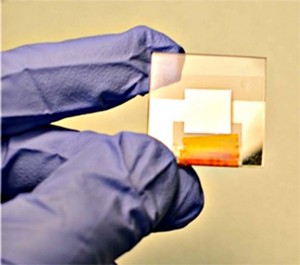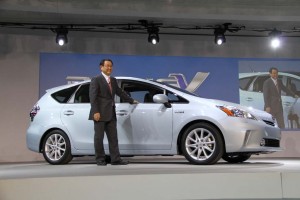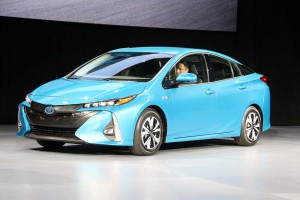Toyota, the automaker credited with creating the world’s first mainstream gas-electric hybrid, plans to reveal its corporate electrification strategy at the North American International Auto Show in Detroit next January, TheDetroitBureau.com has learned.
Though it set in motion the push to battery power with the 1997 debut of the original Prius hybrid, Toyota has been slow to embrace more advanced forms of electrification, with only one plug-in model, the Prius Prime, currently in its line-up. But with governments around the world tightening emissions and mileage mandates – and even considering outright bans on the internal combustion engine, Toyota is expected to outline plans to add dozens of new hybrids, plug-ins and pure battery-electric, or BEV, models to its line-up over the next decade.
But don’t expect to see the Japanese giant abandon the time-tested internal combustion engine, Toyota Motor Corp. President Akio Toyoda cautioned during a news conference in Tokyo on Tuesday. “EVs are in focus at the moment,” he said, “but customers and the market will ultimately decide which powertrains will be successful.”
(Click Here for a guide to the 20+ new battery-electric vehicles set to be on U.S. roads by 2020.)
Toyoda spoke during a preview of a new line of performance models developed by its Gazoo Racing subsidiary. Initially, there will be seven vehicles in the GR series, including a version of the Prius Prime plug-in hybrid.
That reflects a growing trend in the automotive market away from classic, slow-as-molasses hybrids to higher performance models like the Tesla Model S. With its optional Ludicrous Mode, the sedan can launch from 0 to 60 in as little as 2.3 seconds, or roughly as fast as the Dodge Challenger SRT Demon, with its 840-horsepower supercharged V-8.
Toyota helped define the original hybrid vehicle with the launch of the Prius for the Japanese market in 1997. It went global two years later. While the Japanese automaker has launched hybrid versions of a number of models sold through the Toyota and Lexus brands, however, it has been reluctant to embrace more advanced plug-in hybrid, or PHEV, and pure battery-electric technologies. That, officials have explained, reflects concerns about the latest lithium-ion batteries.
Toyota has begun using lithium technology on a few of its latest models, including the Prius Prime and the new Camry Hybrid. But insiders suggest the company may be waiting for even more advanced battery technology before going all-in for electrification. The company has hinted that it is working on an eagerly-awaited breakthrough, so-called solid-state batteries, and plans to introduce them on a new line of BEVs it will bring to market in 2021. It is expected to produce those vehicles at a new plant it will build in the U.S. in a partnership with the smaller Japanese automaker Mazda.

Toyota is widely expected to use next-generation solid-state batteries in an EV it will launch in 2021.
(For the full story on the Toyota-Mazda joint venture, Click Here.)
Solid-state batteries are expected to be lighter, more energy dense and offer quicker charging times when compared to current lithium-ion technology. If costs can be brought down, as well, proponents believe they could make an EV truly competitive with conventional, gas-powered models.
Just how far Toyota will go remains uncertain, but it is clearly feeling pressure from competitors at all ends of the automotive spectrum. In recent months, automakers including Volvo and Aston Martin have laid out plans to offer electrified versions of all future models. BMW, Volkswagen and Daimler AG made similar announcements at the Frankfurt Motor Show last week, and Daimler’s Smart brand will begin migrating to an entirely BEV line-up by 2020.
Most of the other manufacturers will offer a mix of different electrified powertrains, with conventional hybrids expected to dominate. And Toyota President Toyoda signaled his company will take a similar approach.
“Toyota will continue to focus on powertrains that focus on hybrid technology, including fuel cell vehicles, plug-in hybrids and — although we were a bit late to the game – EVs,” said the grandson of Toyota’s found. Toyoda also said his company won’t abandon less complex gas-powered models.
While consumers will clearly play a role in determining what Toyota’s future powertrain mix will be, government regulators will also play a role. Industry analysts believe it will be difficult to meet increasingly stringent global emissions and mileage mandates without heavy dependence on battery power. Meanwhile, Norway and India are two of the countries that have set timetables for phasing out internal combustion engines entirely. Britain, France, Germany and China are among other countries considering similar rules.
How Toyota would address such a development will likely be one of the issues Toyoda addresses when he reveals the company’s electrification strategy early next year.
(Toyota turns up heat with new line of GR performance models. Click Here for more.)


